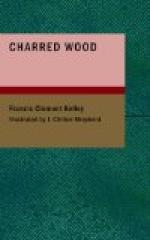The Bishop put out his hand to Mark.
“Good-bye, Mr. Griffin,” he said. “I hope we may meet at another time.”
He looked at Father Murray, but the poor pastor had dropped into a chair, and Mark noticed that his face was white and drawn. For an instant it appeared as though the Bishop would go up to him, for he made one step in his direction. But Father Murray took no heed. Crushed by grief, he stared unseeing into space. The Bishop turned abruptly and followed his secretary to the door. Mark heard them go down the steps. He listened as the door of the car slammed; then he heard the chugging of a motor, and they were gone. The noise grew fainter and fainter. There was silence. Father Murray never moved.
Ann clattered in from the kitchen, calling back an order to one of her assistants. Through the folding-doors she saw Mark.
“Where’s the Father?” she asked, for the priest was hidden by part of the wall between the two rooms. As she came up, Mark pointed to the silent figure in the chair. Ann forgot her importance in an instant, and rushed over to the inert priest.
“What is it, Father?” she cried. “What is it? Are ye sick?”
But Father Murray did not answer.
“Where is His Lordship?” she asked sharply, turning again to Mark.
“Gone.”
“Gone!” Ann almost whispered the word, as if in awe of it. “What! he wouldn’t eat here—again!” Her face showed an agony of rage. “The dirty—but God forgive me—he’s the Bishop—I can’t judge him—”
Father Murray arose, and Ann said no more.
“Hush, Ann,” he cautioned, “hush.” Then, turning to Mark, “Come outside, Mark.”
The two passed out onto the veranda. Father Murray dropped heavily into his chair, with the weight of an old, feeble man. Mark felt that he could not break the tension, but the priest relieved it himself. His voice had a ring of pathos in it, and he addressed Mark as though he needed him and knew he could count upon him.
“My friend, have you ever read Thomas a Kempis?”
“No, Father, I have not.”
“It is a pity, indeed; there is so much of consolation in him when we need it. Listen to this quotation that I have learned by heart: ’If thou thinkest rightly and considerest things in truth, thou oughtest never to be so much dejected and troubled for any adversity; but rather to rejoice and give thanks, yea, to account this as a special subject of joy, that afflicting thee with sorrows I do not spare thee.’ It is Christ speaking, and the quotation is from His Imitation.” Then Father Murray made a gesture as though he were trying to throw it all off.
“Come in, Mark. The other guests did not intend to stay. The Bishop has never broken bread with me since—but let that pass. Come in and eat. It is bitter bread, my friend, bitter bread; but, alas, I must eat it.”




